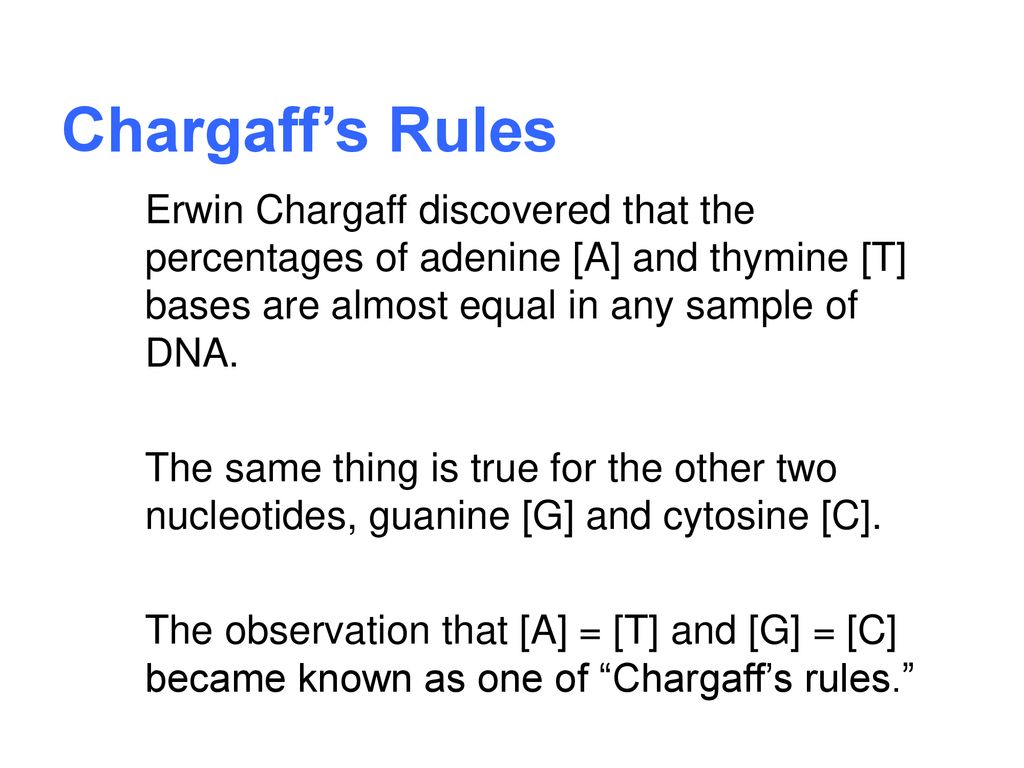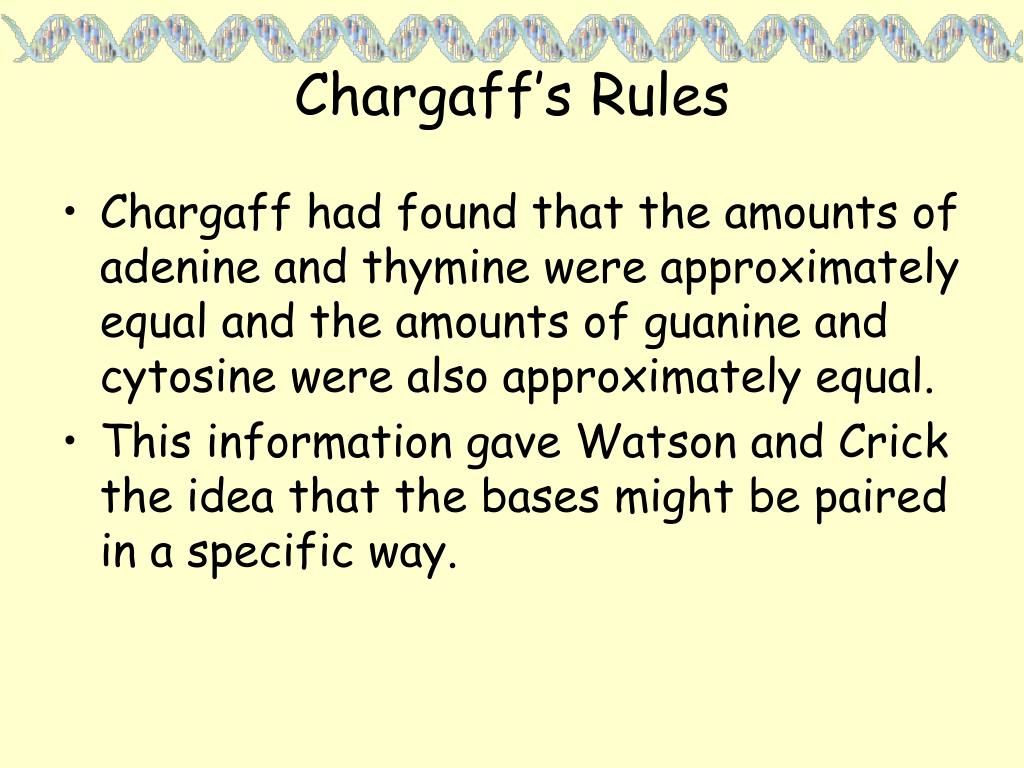What Are Chargaff S Rules
What Are Chargaff S Rules - Chargaff's rule states that dna from any cell of any organism has a 1:1 ratio of pyrimidine and purine bases and, more specifically, that the amount of guanine, a. The nitrogenous bases of dna include the purines adenine (a). Thymine (t) and adenine (a). In double stranded dna , adenine pairs with thymine as we know, it means amount of a = amount of t. The structure of dna requires that adenine always bonds with thymine, and cytosine always bonds with guanine. More specifically, the #a = # t and the #g = # c. Chargaff's rule states that there is always a 1:1 ratio of purines to pyrimidines in dna. This is reflected in the molecular structure of the. Here a=35% so t=35% total will be 100% (for all 4 bases) , left out is 30 %.
The nitrogenous bases of dna include the purines adenine (a). Thymine (t) and adenine (a). This is reflected in the molecular structure of the. More specifically, the #a = # t and the #g = # c. Chargaff's rule states that there is always a 1:1 ratio of purines to pyrimidines in dna. In double stranded dna , adenine pairs with thymine as we know, it means amount of a = amount of t. The structure of dna requires that adenine always bonds with thymine, and cytosine always bonds with guanine. Here a=35% so t=35% total will be 100% (for all 4 bases) , left out is 30 %. Chargaff's rule states that dna from any cell of any organism has a 1:1 ratio of pyrimidine and purine bases and, more specifically, that the amount of guanine, a.
Chargaff's rule states that there is always a 1:1 ratio of purines to pyrimidines in dna. Chargaff's rule states that dna from any cell of any organism has a 1:1 ratio of pyrimidine and purine bases and, more specifically, that the amount of guanine, a. More specifically, the #a = # t and the #g = # c. In double stranded dna , adenine pairs with thymine as we know, it means amount of a = amount of t. Here a=35% so t=35% total will be 100% (for all 4 bases) , left out is 30 %. The structure of dna requires that adenine always bonds with thymine, and cytosine always bonds with guanine. The nitrogenous bases of dna include the purines adenine (a). Thymine (t) and adenine (a). This is reflected in the molecular structure of the.
Chargaffs Rule Worksheet Printable Calendars AT A GLANCE
This is reflected in the molecular structure of the. Thymine (t) and adenine (a). The nitrogenous bases of dna include the purines adenine (a). Chargaff's rule states that dna from any cell of any organism has a 1:1 ratio of pyrimidine and purine bases and, more specifically, that the amount of guanine, a. In double stranded dna , adenine pairs.
Chargaffs Rule
Chargaff's rule states that there is always a 1:1 ratio of purines to pyrimidines in dna. Thymine (t) and adenine (a). Chargaff's rule states that dna from any cell of any organism has a 1:1 ratio of pyrimidine and purine bases and, more specifically, that the amount of guanine, a. In double stranded dna , adenine pairs with thymine as.
Chargaff rules Success criteria Can apply
The nitrogenous bases of dna include the purines adenine (a). This is reflected in the molecular structure of the. Chargaff's rule states that dna from any cell of any organism has a 1:1 ratio of pyrimidine and purine bases and, more specifically, that the amount of guanine, a. In double stranded dna , adenine pairs with thymine as we know,.
What Is The Chargaff Rule
Chargaff's rule states that dna from any cell of any organism has a 1:1 ratio of pyrimidine and purine bases and, more specifically, that the amount of guanine, a. More specifically, the #a = # t and the #g = # c. The nitrogenous bases of dna include the purines adenine (a). Thymine (t) and adenine (a). Here a=35% so.
Chargaff's rule explained YouTube
The nitrogenous bases of dna include the purines adenine (a). In double stranded dna , adenine pairs with thymine as we know, it means amount of a = amount of t. Chargaff's rule states that dna from any cell of any organism has a 1:1 ratio of pyrimidine and purine bases and, more specifically, that the amount of guanine, a..
The DNA Chargaff's rule of DNA composition
The structure of dna requires that adenine always bonds with thymine, and cytosine always bonds with guanine. This is reflected in the molecular structure of the. In double stranded dna , adenine pairs with thymine as we know, it means amount of a = amount of t. Chargaff's rule states that there is always a 1:1 ratio of purines to.
Chargaff's Rules First and Second Rules, Applications
In double stranded dna , adenine pairs with thymine as we know, it means amount of a = amount of t. The structure of dna requires that adenine always bonds with thymine, and cytosine always bonds with guanine. This is reflected in the molecular structure of the. More specifically, the #a = # t and the #g = # c..
Chargaff’s Rules Explained YouTube
The structure of dna requires that adenine always bonds with thymine, and cytosine always bonds with guanine. This is reflected in the molecular structure of the. Thymine (t) and adenine (a). In double stranded dna , adenine pairs with thymine as we know, it means amount of a = amount of t. The nitrogenous bases of dna include the purines.
Chargaff rules online presentation
The structure of dna requires that adenine always bonds with thymine, and cytosine always bonds with guanine. Here a=35% so t=35% total will be 100% (for all 4 bases) , left out is 30 %. Chargaff's rule states that there is always a 1:1 ratio of purines to pyrimidines in dna. In double stranded dna , adenine pairs with thymine.
PPT Introduction to DNA Cloning PowerPoint Presentation ID143905
In double stranded dna , adenine pairs with thymine as we know, it means amount of a = amount of t. Thymine (t) and adenine (a). The structure of dna requires that adenine always bonds with thymine, and cytosine always bonds with guanine. This is reflected in the molecular structure of the. The nitrogenous bases of dna include the purines.
The Nitrogenous Bases Of Dna Include The Purines Adenine (A).
Thymine (t) and adenine (a). Chargaff's rule states that there is always a 1:1 ratio of purines to pyrimidines in dna. In double stranded dna , adenine pairs with thymine as we know, it means amount of a = amount of t. Chargaff's rule states that dna from any cell of any organism has a 1:1 ratio of pyrimidine and purine bases and, more specifically, that the amount of guanine, a.
This Is Reflected In The Molecular Structure Of The.
More specifically, the #a = # t and the #g = # c. Here a=35% so t=35% total will be 100% (for all 4 bases) , left out is 30 %. The structure of dna requires that adenine always bonds with thymine, and cytosine always bonds with guanine.









